Kathy Howard's Blog: Unshakeable Faith for Life, page 36
August 27, 2017
Specific Prayers for Texas Flooding


 I’m glued to the news and weather, watching as flood waters ravage parts of Texas. I’m also texting with friends in the Houston area to confirm their safety. I can’t help today in any physical ways with the Texas flooding, but I can pray. And that’s a powerful tool.
I’m glued to the news and weather, watching as flood waters ravage parts of Texas. I’m also texting with friends in the Houston area to confirm their safety. I can’t help today in any physical ways with the Texas flooding, but I can pray. And that’s a powerful tool.
Maybe you are also watching from a distance and want to pray specifically, but you aren’t sure how. I’ve been brainstorming specific ways we can pray for the current flooding in Houston, south Texas, and beyond. These specific needs/items can be lifted to God in the wake of a wide range of natural events and disasters. And, this list is a work in progress. Please add ideas for specific prayers in the comment section. Let’s keep praying!
Free printable #prayerguide for #TexasFlooding
Click To Tweet
Download a printable PDF list of the following list.
Ways to Pray in Wake of Natural Disasters
Pray for People in the Flooded Areas
Protection of all life, including family pets
Safe transportation to safe areas
Dry, comfortable lodging, safe drinking water, and nutritious food
Quick reunion for any separated families
Long-term housing for those who have lost homes
Ability to communicate with extended family and friends
Pray for Rescue Efforts by First Responders/Emergency Personnel
Reliable cell and phone service so citizens can summon help
Good, reliable communication between agencies
Safety for police officers, firemen, and emergency medical personnel
Strength, stamina and wisdom as they respond to the overwhelming need
Additional manpower from outside the area to meet the need
Pray for Ongoing Relief Efforts
Plenty of volunteer teams and government groups to respond to the need
Physical strength and stamina for the disaster relief teams
Coordination of all volunteer efforts so there will be no gaps and all needs will be met
Enough resources – money, supplies, equipment, food, and water – to meet the needs
Protect the resources from theft, fraud, and accident
Pray for Physical Conditions
Protection from additional rain and tornadoes
Open passages for built up/backed up water to safely drain away
Plenty of sources for clean drinking water
Clear roadways for emergency personnel
The post Specific Prayers for Texas Flooding appeared first on Kathy Howard.
August 24, 2017
5 Signs of Authentic Faith


 Are we living out true, authentic faith in Jesus or simply fooling ourselves? It’s easy to tell, if we take an honest look. The apostle John challenged first century believers – and believers today – to do just that. In his first letter, John clearly laid out signs of authentic faith. And he clearly stated his purpose in writing:
Are we living out true, authentic faith in Jesus or simply fooling ourselves? It’s easy to tell, if we take an honest look. The apostle John challenged first century believers – and believers today – to do just that. In his first letter, John clearly laid out signs of authentic faith. And he clearly stated his purpose in writing:
“I write these things to you who believe in the name of the Son of God so that you may KNOW that you have eternal life (1 John 5:13).
John wanted his readers to be sure they were saved. He longed for them to stand firm in God’s truth and not be swayed by false teachers. And he wanted “false believers” to wake up.
He did not tip toe around the truth. That would not do them, nor us, any good. In the first two chapters of First John, the apostle gave us 5 signs to test our faith. His “If we…, then…, but…” style describes what a true relationship with Jesus will – and won’t – look like.
5 signs of authentic #faith. How does your #faith compare?
Click To Tweet
5 Signs of Authentic Faith
If we walk in darkness, then we do not live by the truth. But if we walk in the light we have fellowship with God.
If we claim to have no sin, then we are deceived and we call God a liar. But if we admit and confess our sin, God will forgive us and give us Jesus’ righteousness.
If we do not obey God’s commands, then the truth is not in us. But if we obey God, it reveals we truly know Him and His love is made complete in us.
If we do not love fellow believers, then we still live in darkness and prone to fall. But if we love other believers, we live in the light.
If we love the world, then it proves we do not have God’s love. But if we do not love the things of the world it shows we truly have eternal life.
So, how are we doing? Are we walking in the light or in the darkness?
You may also be interested in: How to have a relationship with Jesus
The post 5 Signs of Authentic Faith appeared first on Kathy Howard.
August 21, 2017
Find Hope in the Psalms
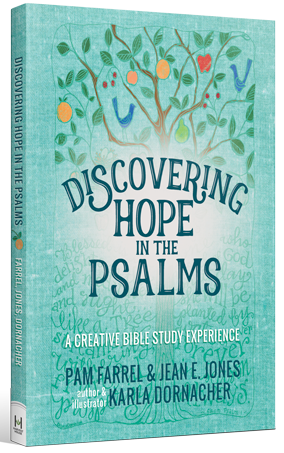

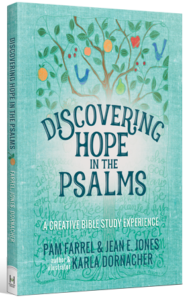 Feeling discouraged? Need a bit of hope? There is no better place to go to find hope and encouragement than God’s Word. And the book of Psalms is a great place to begin. (Note: This post is a giveaway! Read to the end to find out how to enter!)
Feeling discouraged? Need a bit of hope? There is no better place to go to find hope and encouragement than God’s Word. And the book of Psalms is a great place to begin. (Note: This post is a giveaway! Read to the end to find out how to enter!)
Recently, I received a copy of a great new Bible study from my friend Pam Farrel. Pam is one of the authors of “Discovering Hope in the Psalms.” Pam and her coauthors, Jean E. Jones and Karla Dornacher, have created a truly creative Bible study experience. The material guides the reader to not only dig deep into 10 separate psalms, but it also helps the reader artistically express what she is learning and draws her into worship.
Below, as stated in the book’s introduction, is the authors’ purpose for writing:
Our desire to share the riches of hope from Psalms with you is the inspiration behind the creation of this journey. By the end of our time together, you’ll know how to pray and hope in dark times and how to rejoice and act wisely at all times. You’ll grasp eight hopes from Psalms that will draw you closer to God and will brace you in troubling times. You’ll confidently interpret the psalms and hold on to their messages as lifelines.
Even though this book is filled with creative ways to express and apply what we’re learning, this is not a “fluffy” study. The authors obviously want us to be filled with the meaty truth of God’s Word. What a great combination – a main dish of deep spiritual truth served with creative, expressive sides!
Discovering #HopeinthePsalms #giveaway #entertowin
Click To Tweet
I have started this study myself. I plan to be sharing some of what I learn -and create! – here and on social media. It’s not too late for you to join me. Order your copy today and we can work along together! Or… Pam Farrel will be leading a study through the book live on Facebook. Follow this link to find out how to sign up! I’ll be there when I can.
Need #hope? Discover #hopeinthepsalms
Click To Tweet
Why the Psalms?
The book of Psalms is a collection of praises, prayers, and songs. Hebrew poets wrote them – many by David – under God’s inspiration over the course of about 1,000 years. The intent of the psalms is that God’s people would use them to worship Him.
Here’s a bit more from the study:
The Psalms extol God’s goodness and power. They voice our gratitude and hopes, our sorrows and longings. When we sing or pray them, they teach us eternal truths and commit us to godly actions and attitudes. They draw us near to God… Although worship is our gift to God, when we worship with psalms, something happens within us: Hope soars, and we are transformed. The psalms proclaim the hopes to which we have been called, and in our attempts to bless the living God, we find ourselves blessed.
Makes you want to dig into the Psalms doesn’t it? Also wanted to share with you a glimpse of one of the beautiful creative aspects of this study. Each week of study includes a full page illustration by Karla that creatively expresses that week’s Psalm. (The pics below illustrate the truth of Psalm 1. The color is mine!)


This post is a giveaway! The authors and Harvest House Publishers have graciously made a copy available for me to send to one of you! The drawing for the winner will take place at noon central time on Wednesday, August 23rd. You can enter the drawing up to 3 times. Here’s how:
Comment on this post and tell us which psalm is your favorite and why.
Share this post on Facebook, then comment again here to let me know you shared.
Share this post on Twitter, Pinterest, or Instagram and comment again here to let me know you shared.
In order for your name to be entered multiple times, you must make each comment separately.
The post Find Hope in the Psalms appeared first on Kathy Howard.
August 17, 2017
9 Tips to Help You Choose the Right Bible Study Material
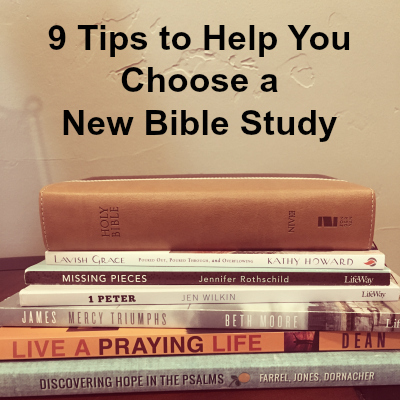

 This post first ran in August of 2014. But the tips for choosing a Bible study still apply!
This post first ran in August of 2014. But the tips for choosing a Bible study still apply!
I have dealt with Bible study from almost every conceivable angle. I have studied my Bible and used Bible study materials for decades. I have participated in countless Bible study groups. I have led Bible study groups. I have organized women’s Bible study for several churches. And I have written Bible study curriculum.
Yet, there is one question I still must grapple with again and again. “What study material should I use?” Whether you are a ministry leader selecting material for a group or an individual choosing a book for your personal study, your question is the same. “What study material should I use?”
How do I choose my next #BibleStudy?
Click To Tweet
With so much great material available, the answer is seldom easy. The sheer abundance of choices can be overwhelming. Add to that the scope of your options – everything from looking at classic TV shows with a biblical lens to in-depth, exegetical Bible book studies – and the task becomes daunting!
9 Tips for Choosing Bible Study Material
However, these tips can get help you narrow down your choices. The following tips were written from the women’s ministry leader’s perspective but are also applicable to the individual Bible student!
Establish your purpose – Recall why you study the Bible and keep that foremost in your mind. Through His Word, God reveals Himself, His ways, and His will. Our primary goals should be to know and experience God more deeply and to allow Him to make us more like Jesus. A good Bible study will have the same goals for its readers.
Contemplate the needs of the students (or yourself) – For instance, do they need the doctrinal basics or are they ready for something deeper? If part of your purpose is to appeal to seekers, consider a study on a topic such as parenting. Young moms have different life needs and interests than empty nesters. They also have less time! Make sure the topic and the time required will fit your group.
Consider the experience of your leaders – Less experienced leaders will benefit from a study that has a solid, helpful leaders’ guide. Those with more experience won’t necessarily need one. If your leaders are inexperienced or not confident, look for a study with lots of leader helps! If you plan to study on your own, consider your own level of experience. For instance, if this is your first time to do a Bible study, fewer weeks may be better to start.
Enlist a few trusted friends – Enlist 3 or 4 women who have lots of Bible study experience to help you in the process. First, ask for study and author recommendations. Then later, after you have gathered a few possibilities, ask them to help you read through and review the selections. If you are an individual, ask trusted friends for their recommendations.
Do a little research – Visit your local Christian bookstore and browse the Bible study section. If you’re looking for a very specific topic, check the non-fiction or Christian living section. Many trade books now include group discussion questions. Also do topic searches on online bookstores like Amazon and ChristianBook.com to find lots of options!
Explore a few new authors – During your research, take a look at a few authors you’ve never used before. We all have our favorites, but different voices can bring freshness and encourage us to look at timeless truths in new ways. Visit the authors’ websites, check their “statement of beliefs,” and check out reader reviews.
Gather some options – After your research, narrow it down to a handful of options and purchase a single copy of each. Review those choices with the help of your enlisted friends.
Check the doctrine – Just because a book is published by a Christian publisher doesn’t mean the author’s doctrine will line up with your church’s understanding of God’s truth. Some things are insignificant like how often we should partake of the Lord’s Supper. Others – like how we are saved – are non-negotiable. Make sure the material is on solid ground!
Confirm the material encourages spiritual growth – Go back to your purpose to make your final decision. Some material can be engaging and even grow our biblical knowledge, yet not encourage application and growth.
Cover it all with prayer and you’re ready to select the next Bible study for your women. Happy studying!
What tips do you have for choosing new Bible study material??
The post 9 Tips to Help You Choose the Right Bible Study Material appeared first on Kathy Howard.
August 14, 2017
The What, Why, and How of Devotional Bible Reading
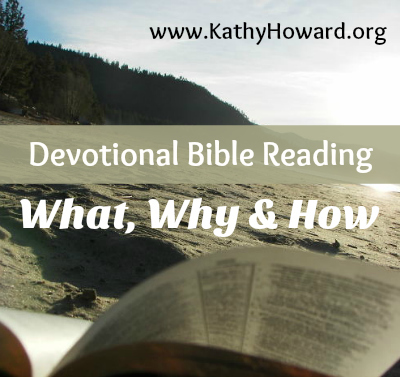

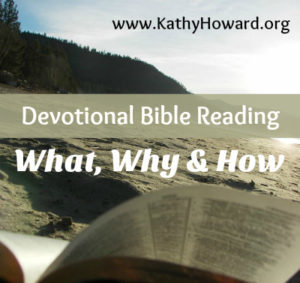
What is devotional Bible reading? Should we do it and if so, how do we do it?
Devotional Bible reading focuses on your personal relationship with God. The primary goal is not to gain biblical knowledge – though that will happen too. It’s not for the purpose of preparing to teach others – although you will become more prepared. The main purpose of devotional Bible reading is your “spiritual edification.” This time of devotion is for you to hear from God with the help of His Holy Spirit.
Why should I read the Bible devotionally?
“Spiritual edification” is a really churchy phrase, but it carries a lot of meaning. Here’s a quick rundown of the goals and benefits of reading our Bible to be “built up” spiritually:
To express our sincere devotion to God
To give God an opportunity to reveal His presence
To heighten our affection for God and build deeper intimacy
To find guidance, encouragement, wisdom, peace, and renewal
To align our thoughts, our will, our actions with God’s
To encourage continued spiritual growth
Ah! We want to encounter the living God through His living Word. And through that encounter, to allow God to continue to conform us to the image of Christ.
#DevotionalBibleReading Encounter the living God through the living Word
Click To Tweet
How do I read the Bible devotionally?
Since in-depth Bible study is very active, you may think devotional reading is more passive. But it is in fact, quite active. The devotional style combines reading, prayer, listening, and response. While the only must-have is your Bible, there are a few other tools that will benefit your devotional time:
Pen, highlighters, and or colored pencils
Wide-margin Bible, journaling Bible, notebook, or journal
Bible reading plan
Read with intent – First, don’t read haphazardly. Don’t just open the Bible and drop your finger on a verse. Have a plan. For instance, use a Bible reading plan or work through a Bible book from beginning to end. Second, don’t just read the words. Pray before, during, and after. Expect to hear from God and actively listen for Him to speak to you through the Scripture and through the quiet prompting of His Spirit.
Meditate on the passage – Meditation is not emptying your mind. It is deep thinking on spiritual truths. As you read, linger over verses that impact you. Allow God to apply these truths to your life. Use your journal to record insights and impressions. Or use colored pencils to creatively illustrate truths in the margins of your Bible or in a journal.
Ask God questions and “listen” for His answers – Below are examples of questions you can use to interact with the Scriptures you read:
Does this passage present some truth that should change what you believe or the way you think about God?
Does this passage prompt you to praise God, thank God for something specific, or trust God in a situation?
Is there something in this passage you should pray for yourself or for someone else?
Does this passage bring to mind a sin you need to confess?
Is God using this passage to move you to a particular act of obedience or to make a decision?
Respond to God’s leading – The Word of God has the power to search our minds and penetrate our hearts. God will use it as both a balm to our souls and a scalpel to our hearts (Hebrews 4:12-13). He knows exactly what we need. We need to respond. We may need to repent from a specific sin. We may need to step out to heal a relationship. We may need to change the way we think about a particular issue. Or we may need to simply sit in the comforting, healing presence of our Savior. However God leads, let us respond.
4 steps to read the Bible devotionally #BibleReading
Click To Tweet
What has been your experience with devotional Bible reading? Any helps or tips?
A few other article you may find helpful:
3 Common Ways to Read Scripture
8 Tips for Engaging with Your Bible Devotionally
Devotional Bible Study is Not an Option
11 Tips for Spending Quality Time with God
The post The What, Why, and How of Devotional Bible Reading appeared first on Kathy Howard.
August 10, 2017
The 4 “R” Bible Study Method


 There is not just one right Bible study method. Depending on your goal, you can dive into God’s Word in lots of different ways. For instance, you can do a word, character, or topical study. You can dissect and ingest a small passage, a chapter, or an entire book.
There is not just one right Bible study method. Depending on your goal, you can dive into God’s Word in lots of different ways. For instance, you can do a word, character, or topical study. You can dissect and ingest a small passage, a chapter, or an entire book.
However, there are some general guidelines for all and any Bible study. For instance, we must keep the genre of the book and the context of the passage in mind. We must seek to discover the original meaning of the passage. There are infinite ways to apply a passage, but only one meaning. And, to keep the proper perspective, we must always keep in mind that God’s Word is first and foremost about God.
This Bible study method below is a basic way to dig a little deeper into any biblical passage. You don’t need extra tools or resources. All you need is your Bible, a pen, a notebook or journal, and a humble, teachable attitude. The “R” repetition makes it easy to remember! You can literally take it anywhere! (Click here to get a printable PDF of the following study method.)
Basic #BibleStudy Method. Take anywhere
Click To Tweet
The 4 R Bible Study Method
Read – Read the entire passage. For instance, if you plan to study the book of Philippians, read all 4 chapters in one sitting. If you plan to study John 15, read the entire chapter. If you can, it’s helpful to read the passage from several different translations. If you want to go the extra mile – or if your passage is relatively short – rewrite the passage in your own words.
Record – Read the passage again with the attitude of an investigative journalist. If you plan to study a larger passage or book, break it up into chunks to make it manageable. Observe the text, ask the journalistic questions – who, what why, where, and when – and record what you discover. Here are a few other things to look for and record:
Facts
Keywords, repeated words and phrases
People
Places
Timing
Who is writing to who and why
Recognize – Read the passage again and look back over your written observations. Ask God to show you what eternal truths and principles this passage teaches. For instance, what do you learn about God, His character, and His ways? What do you learn about Jesus and what it means to follow Him? What do you learn about the church, salvation, a life of faith, godly relationships?
Respond – This is where the rubber meets the road! How does God want you to apply His truth to your life today? Is there some sin to confess and turn away from? Is there a relationship that needs to be healed? Is there a command to be obeyed or an act of service to perform? Are there beliefs and ways of thinking that need to be conformed to God’s truth?
This Bible study method is so flexible! You can work through it in one sitting with a small passage or weeks with a larger passage or book. Check below for a list of a few helpful resources that will give a good foundation to a lifetime of purposeful Bible study.
I’d love to hear about your favorite Bible study method! Please share!

A few resources you may find helpful:
How to Read the Bible for All Its Worth by Gordon Fee and Douglas Stuart
Rick Warren’s Bible Study Methods by Rick Warren
Women of the Word by Jen Wilkin
How to Study Your Bible by Kay Arthur
The post The 4 “R” Bible Study Method appeared first on Kathy Howard.
August 7, 2017
6 Ways to Connect with Others for Jesus


 We don’t have to travel to a foreign country to encounter a different culture. Not only has the world come to America, but also the American culture embraces values far different than the godly standards Christians seek to live by. How can we connect with others so vastly different than ourselves in order to share Jesus and His priceless gift of salvation?
We don’t have to travel to a foreign country to encounter a different culture. Not only has the world come to America, but also the American culture embraces values far different than the godly standards Christians seek to live by. How can we connect with others so vastly different than ourselves in order to share Jesus and His priceless gift of salvation?
The apostle Paul purposefully worked to fit into the culture where he ministered. He removed all the roadblocks he could and sought to build bridges to earn trust and to gain opportunity to share the Gospel. He kept his prime directive in mind: “My only aim is to finish the race and complete the task the Lord Jesus has given me —the task of testifying to the good news of God’s grace” (Acts 20:24, NIV).
Paul did everything he could to open doors to share the Gospel. Most of us probably won’t be given the opportunity to talk to Greek philosophers about Jesus on a hilltop in Athens (Acts 17:16-34) or share our testimony with a king (Acts 26:1-32) like Paul. However, we can work to “become all things to all people so that by all possible means we (I) might save some” (1 Corinthians 9:22, NIV).
6 ways to #connect with others #Gospel
Click To Tweet
6 Ways to Follow Paul’s Example to Connect with Others:
Find a common life experience or interest – In Acts 17, Paul the evangelist found affinity with the Athenian philosophers. They both liked to engage in deep, thoughtful conversation. Even if your new neighbor comes from the other side of the world you can find common ground. Maybe you’re both parents, or like to garden, or are both trying to get rid of fire ants in your yard. Whatever it is, it’s a place to start.
Adopt their speech – As long as it’s not profane or “unedifying,” use their style of conversation. For instance, when I lived in the north, I said “you guys” and “soda” instead of “y’all” and “coke.” Paul used general sentiments and words his hearers would have known, understood, and accepted. Too often we use words and phrases that are very familiar to Christians, but they sound very foreign to the non-Christian (See “7 Churchy Words”).
Compliment them – Of course, this must be genuine. Paul found something about which to commend the Athenians (Acts 17:22). Look for something about them on which to positively comment or admire. This small effort will help them understand you’re not “against them.”
Find a launch pad – In Athens, Paul spotted an altar to “an unknown god.” This altar gave Paul the opening he needed to talk about Jesus. We may learn of a cultural idea we can use as a springboard to introduce spiritual truth. Or perhaps your new friend is struggling with difficult circumstances, and therefore open to words of spiritual encouragement.
Respect their cultural mores –Paul did not demean or insult their culture or customs. He even conformed to them when they did not conflict with God’s holy standards. When Paul began ministry to the Gentiles, he began going by his given Greek name and did not stick to a kosher diet.
Serve the truth with grace – Christians sometimes try to force God’s standards of values, beliefs, and behavior on non-Christians. We forget that to a person without the indwelling Holy Spirit, the things of God seem “foolish” (1 Corinthians 2:14). Our first priority should be to introduce them to Jesus. But honest, grace-filled conversations about “controversial” topics within the context of relationship can spark interest in Jesus (Colossians 4:5-6). So let’s always be prepared to lovingly, respectfully, and biblically speak to specific topics when asked (1 Peter 3:15). (See “Grace or Truth?”)
I would love to hear how you have purposefully worked to find ways to connect with the people around you to build relationships and ultimately share Jesus.
The post 6 Ways to Connect with Others for Jesus appeared first on Kathy Howard.
August 3, 2017
3 Attitudes I Need to Approach God’s Word
 I do a lot of reading. In addition to God’s Word, I read novels, cookbooks, blogs, articles, non-fiction books and more. Some of this reading is for fun. Other reading is for instruction or information. Some I approach casually. Other with skepticism. Some things I read might instruct my behavior. Other things I dismiss as irrelevant or even wrong.
I do a lot of reading. In addition to God’s Word, I read novels, cookbooks, blogs, articles, non-fiction books and more. Some of this reading is for fun. Other reading is for instruction or information. Some I approach casually. Other with skepticism. Some things I read might instruct my behavior. Other things I dismiss as irrelevant or even wrong.
But the Bible is different from anything else we might read. Unlike everything else, it was not written by man, but directly inspired by God Himself. God’s words, God’s heart, given to us. How should we approach the Bible? What attitudes are vital to not only read God’s Word, but to really hear it, to be shaped by it?
How should we approach the #Bible. What’s your attitude?
Click To Tweet
I need an attitude adjustment
Humility – Far too often I approach God’s Word with some level pride. Pride in thinking I already know this passage. Pride that I don’t need what He has to say. Oh, but pride is a great deceiver, keeping me from everything God has for me in His Word. Do I really want God to teach me? To use me for His purposes? Then I must humbly allow Him to correct, rebuke, and train me through His Word (2 Timothy 3:16-17). “He guides the humble in what is right and teaches them His way” (Psalm 25:9).
Submission – Some days I take God’s Word far too casually. I read it and hear His gentle whisper to “tell” or “do” or “go” or “stop.” And I consider obedience. The Bible is God’s authority for my life. It is living, actively penetrating the deepest parts of my heart, mind, and soul to judge my attitudes, thoughts, behaviors, and intentions. To make me more like Jesus. How dare I ever tell Him “no.”
Anticipation – God’s Word is light and life and hope. It guides, delivers, and comforts. God’s laws are right and true and trustworthy. The Word of God gives wisdom and joy. I should run to read His Word each day, greatly anticipating the treasure I will find there. Sometimes I do, but not always.
Need an #attitude adjustment? What attitude to we need to approach #GodsWord?
Click To Tweet
God has reminded me today I need a little attitude adjustment. What about you? Do you approach God’s Word with humility, submission, and anticipation?
Lord God, adjust my attitude today. Forgive me of pride and foster a humble spirit within me. Help me submit to the authority of Your Word, so that I will live a life a full obedience to You. And grant me the joy of anticipation, always delighting in the discovery of Your Word. Amen.
The post 3 Attitudes I Need to Approach God’s Word appeared first on Kathy Howard.
July 31, 2017
3 Tips for Understanding Proverbs
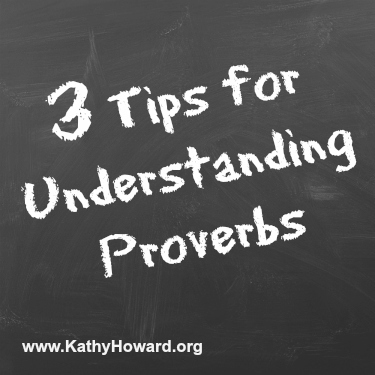

 Want to live wisely? Then read the book of Proverbs. They are chock-full of biblical wisdom and insight. Proverbs are easy to remember and often fun to say. For instance, men love to quote Proverbs 21:9: “Better to live on a corner of the roof than share a house with a quarrelsome wife.” (Ladies, unfortunately this is sad, but true!)
Want to live wisely? Then read the book of Proverbs. They are chock-full of biblical wisdom and insight. Proverbs are easy to remember and often fun to say. For instance, men love to quote Proverbs 21:9: “Better to live on a corner of the roof than share a house with a quarrelsome wife.” (Ladies, unfortunately this is sad, but true!)
However, believers today often misunderstand or misuse this ancient form of wisdom writing. In today’s post, we will briefly define a proverb and then consider 3 interpretive tips that will help us understand this practical advice for living.
What is a proverb?
A proverb is an observation of life stated in a memorable way. It is a “persuasive saying proven true by experience” (“Encountering the Old Testament” by Arnold and Beyer, page 314). Proverbs are not unique to the Bible. Many ancient cultures made us of this literary device.
However, for the ancient Israelite, the purpose of a proverb was to “apply the principles of Israel’s covenant faith to everyday attitudes, activities, and relationships” (“Old Testament Survey” by Lasor, Hubbard, and Bush, page 460). Biblical proverbs are also an observation of life, but they also acknowledge that true wisdom comes from God (Proverbs 1:7).
How can we understand the Proverbs?
Like the rest of Scripture, the Proverbs must be understood in light of their purpose, literary genre, context, and original meaning (See also “4 Things to Consider for Biblical Context“). Since proverbs are a unique literary style, we cannot interpret them in the same way we do a historical book or an epistle.
Although the tips below are just a tip of the hermeneutical iceberg, they will get us off to a great start in understanding the Proverbs and applying their wisdom to our lives.
3 Tips to understanding Proverbs:
A Proverb is a Principle, Not a Promise
A biblical proverb seeks to apply God’s wisdom to the situations of life. They are guidelines for living, general principles, not promises from God. While generally accurate, they do not take into account every possible scenario or individual circumstance. Therefore, they are not guarantees of a certain outcome, but rather point hearers to the best chance for success.
“Start children off on the way they should go, and even when they are old they will not turn from it.” Proverbs 22:6
Many of us have known Christian parents who claimed Proverbs 22:6 as a promise and then were disillusioned when a child turned away from God and never returned. This demonstrates how important it is to understand the nature of a proverb.
A Proverb is Pithy Poetry
A proverb is a saying that encapsulates a broad observation about life. Its primary goal is to state an important, simple truth about life in easy-to-remember terms.
“Wounds from a friend can be trusted, but an enemy multiplies kisses.” Proverbs 27:6
Brief and memorable, this proverb is about something much deeper than flesh wounds and kisses. True friends tell us the truth for our good, even when it hurts. “Enemies” simply tell us what we want to hear or butter us up to get something they want.
Let’s look beyond the surface and past the simple, catchy words of a proverb to find the deeper truth. Then let’s apply that godly wisdom to our lives.
A Proverb has a Proper Perspective
Ancient standards guide these ancient proverbs. They usually speak of simple desires and basic needs. Yet, often we subconsciously impose our modern, Western mindset and values.
“Whoever gives heed to instruction prospers, and blessed is the one who trusts in the Lord” (Proverbs 16:20).
Just imagine how the influence of our affluent culture can affect our understanding of “prospers” and “blessed.” The typical ancient Israelite considered himself blessed if he had shelter and enough food.
We could talk a lot more about proverbs. However, if we remember these 3 tips, we will be well on our way to wise living!
Did any of these 3 surprise you? In light of these 3 tips, have been misunderstanding a particular proverb?
The post 3 Tips for Understanding Proverbs appeared first on Kathy Howard.
July 27, 2017
Where is God when Marriage is Hard?


 My guest today is Laura Taggart, author of the newly released book “Making Love Last.”
My guest today is Laura Taggart, author of the newly released book “Making Love Last.”
Marriage is hard. Think about it. You and your mate come from different family histories. Different genders mean you think, process, and operate differently. Different personalities create challenges as you try to merge two lives with different ways of thinking and reacting.
Sound like a recipe for disaster? Amazingly God designed it that way. What was He thinking?
Year thirteen of my marriage was excruciatingly painful. My husband was doubting his love for me and not inclined to stay the course. I was disappointed with God for what I perceived as His lack of faithfulness. After all, I had tried the best I knew how to be faithful to Him, to love my husband and raise our children to know Him.
In the midst of my frustration and self-pity, I had a reckoning. What if, in the turmoil, God was doing something in me! What if God was being His good self in the middle of this mess? In that moment, I realized I didn’t want to miss what God had for me. Even in struggle.
I determined to hold onto God no matter what. I began to let go of my own perceptions. My hurt and disappointment began to dissipate. In time, I realized my expectations of my husband stifled his ability to be himself. I wanted my husband to love me my way and he wasn’t cooperating. I had relied on him for the unconditional love that only God can provide.
Where is God when #marriage is hard? #LauraTaggart #MakingLoveLast
Click To Tweet
I began to lean into God more for my needs and trust His love to be enough. As I began to experience the security of God’s love, the fears that fostered high expectations from my husband began to lessen. I relied on God’s strength. My trust in Him grew. I gained confidence in his presence and provision.
“My God is my rock, in whom I take refuge, my shield . . . my stronghold.” Psalm 18:12
As my anxiety diminished, I began to live with an open heart, enjoying the present. Rather than concentrating on my needs and my husband’s failures, I began to see the difficulties of our life together as an opportunity for my growth. This was life-altering. Paying more attention to my own unloving ways brought new life into our relationship.
Feeling totally accepted by God – just the way I am – helped me show my husband the same acceptance. When he began to realize my love for him was secure, that my previous high level of expectations were gone, his self-defenses dropped. Then amazing things began to happen. He began to change.
Are your spouse’s harshest critic or biggest fan? #Marriage
Click To Tweet
Intimate relationship is powerful. Marriage, our most exposing of all relationships, provides the most transformational opportunity of our lives. I can choose to be my mate’s harshest critic or biggest fan. If I can accept him in his humanness and trust God for what I need, I am more able to be thankful for the gift of my husband and less disappointed by what he isn’t. And I can begin to see God’s goodness in the mess.
Marriage is hard. Back in year thirteen, I couldn’t even imagine the sweet relationship my husband and I enjoy today. If your marriage is hard today, don’t give up! God is working through the hardness to carve out something beautiful!
 Laura Taggart is a Licensed Marriage and Family Therapist and author of “Making Love Last: Divorce-Proofing Your Young Marriage” (released July 4, 2017). She has been an Adjunct Professor of Counseling for Fuller Theological Seminary, Northern California Campus. Laura is an international speaker on topics of marriage, parenting, and Christian spirituality.
Laura Taggart is a Licensed Marriage and Family Therapist and author of “Making Love Last: Divorce-Proofing Your Young Marriage” (released July 4, 2017). She has been an Adjunct Professor of Counseling for Fuller Theological Seminary, Northern California Campus. Laura is an international speaker on topics of marriage, parenting, and Christian spirituality.
With one-third of all married couples divorce before their ten-year  anniversary, in “Making Love Last” Taggart offers the wisdom she would share as a counselor with a couple in the early years of marriage. She helps couples examine their true expectations for marriage, provides six action steps for improving the way they relate, and gives them a new picture of what it means to enjoy marriage for a lifetime. Each chapter includes discussion questions for couples or small groups as well as additional questions for personal reflection.
anniversary, in “Making Love Last” Taggart offers the wisdom she would share as a counselor with a couple in the early years of marriage. She helps couples examine their true expectations for marriage, provides six action steps for improving the way they relate, and gives them a new picture of what it means to enjoy marriage for a lifetime. Each chapter includes discussion questions for couples or small groups as well as additional questions for personal reflection.
The post Where is God when Marriage is Hard? appeared first on Kathy Howard.



